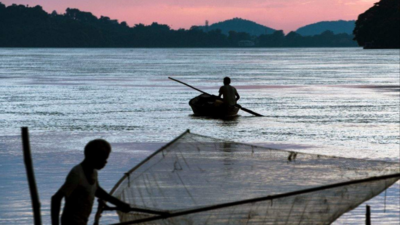- News
- City News
- Hyderabad News
- Andhra Pradesh, Kerala, Tamil Nadu high on drug-resistant bacteria in aquaculture: Report
Trending
This story is from September 22, 2021
Andhra Pradesh, Kerala, Tamil Nadu high on drug-resistant bacteria in aquaculture: Report
A two-decade analysis of anti-microbial resistance from aquaculture and fisheries in Asia shows Andhra Pradesh, Kerala and Tamil Nadu have emerged as multi-drug-resistant hotspots.

The aquatic food industry has emerged as one of the largest consumer of anti-mirobial drugs
HYDERABAD: A two-decade analysis of anti-microbial resistance from aquaculture and fisheries in Asia shows Andhra Pradesh, Kerala and Tamil Nadu have emerged as multi-drug-resistant hotspots.
The other hotspots of multi-drug resistance in freshwater environments include eastern Turkey, Yangtze river in China, Poyang lake, Mekong river and its delta in southern Cambodia and Vietnam.
In the latest edition of Nature, researchers analysed 749 antibiotic-resistant bacteria from aquatic animals in Asia with help of data extracted from 343 articles published from 2000 to 2019.
“We found concerning levels of resistance to medically important antimicrobials in food-borne pathogens. In aquaculture, the percentage of antimicrobial compounds per survey with resistance exceeded 50% between 2000 and 2018,” the research says.
The study was conducted by Centre for Diseases Dynamics, Thomas P. Van Boeckel of Economics and Police based at New Delhi, Spatial Epidemiology Laboratory of Université Libre de Bruxelles and Institute for Environmental Decisions based in Zurich.
The aquatic food industry has emerged as one of the largest consumer of anti-mirobial drugs. Certain species of fish like catfish are found to be associates with more anti-microbial use rate per kilogram when compared to humans and terrestrial animals.
The study suggested calling up surveillance to strengthen epidemiological evidence on anti-microbial resistance.
“The analysis done by researchers revealed startling facts. It is a big wake up call. The central and state governments should come up with aquaculture and fisheries interventions to mitigate the impact of anti-microbial resistance as suggested by experts,” marine biologist Dr Duggaraju Srinivasa Rao said.
“Catfish is illegally cultured and sold as murrel fish. Most of the hotels serve catfish in the name of Apollo fish,” Rao added.
The other hotspots of multi-drug resistance in freshwater environments include eastern Turkey, Yangtze river in China, Poyang lake, Mekong river and its delta in southern Cambodia and Vietnam.
In the latest edition of Nature, researchers analysed 749 antibiotic-resistant bacteria from aquatic animals in Asia with help of data extracted from 343 articles published from 2000 to 2019.
“We found concerning levels of resistance to medically important antimicrobials in food-borne pathogens. In aquaculture, the percentage of antimicrobial compounds per survey with resistance exceeded 50% between 2000 and 2018,” the research says.
Researchers mapped anti-microbial resistance at 10-km resolution and found resistance hotspots along major river systems in Asia and the coastal waters of India and China.
The study was conducted by Centre for Diseases Dynamics, Thomas P. Van Boeckel of Economics and Police based at New Delhi, Spatial Epidemiology Laboratory of Université Libre de Bruxelles and Institute for Environmental Decisions based in Zurich.
The aquatic food industry has emerged as one of the largest consumer of anti-mirobial drugs. Certain species of fish like catfish are found to be associates with more anti-microbial use rate per kilogram when compared to humans and terrestrial animals.
The study suggested calling up surveillance to strengthen epidemiological evidence on anti-microbial resistance.
“The analysis done by researchers revealed startling facts. It is a big wake up call. The central and state governments should come up with aquaculture and fisheries interventions to mitigate the impact of anti-microbial resistance as suggested by experts,” marine biologist Dr Duggaraju Srinivasa Rao said.
“Catfish is illegally cultured and sold as murrel fish. Most of the hotels serve catfish in the name of Apollo fish,” Rao added.
End of Article
FOLLOW US ON SOCIAL MEDIA











